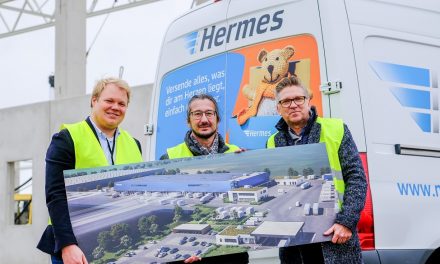
“Internationalisation” is the future says Hermes Group, passing €2bn revenue mark
Anglo-German parcel carrier Hermes Group has recorded sales of more than EUR 2bn for the first time in its history. The business owned by the German distance-selling retail giant Otto Group said today that its 12 individual companies grew their combined sales by 8% year-on-year in 2013, to achieve a total revenue of EUR 2.083bn.
The achievement came on the back of a 10% growth in parcel volumes, with the Group as a whole handling around 496m items during the year.
As well as holding its own in the highly competitive German parcel market, Hermes said its EUR 2bn milestone was achieved thanks to double-digit growth in sales and shipment volumes within its UK business.
The plan now is to expand the Group’s presence in European cross-border deliveries, working in some of the smaller EU markets.
Hanjo Schneider, the Otto Group board member and CEO of Hermes Europe, said Otto was benefiting today from the establishment of its own logistics and delivery systems in the European countries with the largest e-commerce industries.
“The future of the parcel business is partly in internationalisation – eventually merchants want to sell their goods globally,” said Schneider. “Accordingly, we are now strengthening our presence in smaller European countries, and we are working closely with leading parcel services in the various national markets to integrate their networks into our organisation.”
Hermes said during the year it added 700 new jobs for a total of 11,814 in its work force.
The company’s core business saw 492m mailpieces and parcels moved in Hermes companies in Germany, Britain, Austria, Italy and Russia in 2013, up 9% on last year’s total.
The package business accounted for more than 477m of those shipments, up 14.5% on 2012, with about 70% of the volume shipped for customers outside the Otto Group.
Hermes also handled 3.9m items of furniture and large electrical appliances through its two-man delivery teams.
Internationalisation
Some of the best growth in the Group came in the UK, where the company has invested EUR 30m in expanding its logistics infrastructure, and plans to have a network of 5,000 parcel shops in place by the end of this year.
Hermes said its plans now aim to “significantly” expand into more European countries in 2014 by working with national delivery partners. This will see an improvement and expansion in cross-border services, with more merchants selling long-distance able to deal with their shipping services through a single provider, the company said.
The company said by the end of 2014 it hoped to have 36,000 parcel shops across Europe.
Back in November, Hermes Group opened its newest and largest laboratory for quality testing and certification outside Europe, in Shanghai. The facility provides product testing and consulting services to merchants in Asia selling to the European consumer.
Hermes is also investing in its international network of ocean and air freight, transporting items from more than 20 countries outside Europe, including to and from the USA, Brazil and South Africa. The Group is looking for more business in China through providing added-value services to merchants there, after opening the first online store in China for Lascana, the female clothing firm that is part of Otto Group.
Germany
The company said the ongoing e-commerce boom will mean continuing growth in Germany, where growing customer expectations are paving the way for Hermes to introduce estimated delivery windows for its services. This would compete against the likes of DPD, which has shown considerable success from offering more predictable, narrower delivery timeslots for consumers shopping online.
Schneider said given the difficulties in the business-to-consumer market and the high expectations among consumers, parcel companies ought to work more closely together.
He said Hermes was ready to talk to potential partners.
“Given the growing service demands as well as the well-known economic and environmental challenges, parcel delivery services should examine ways to cooperate. More common transport and closer network would be in the interest of the industry, and customers would benefit from common solutions,” said Schneider.












